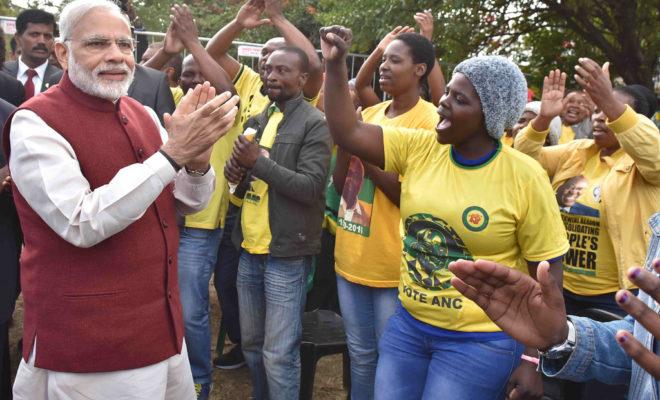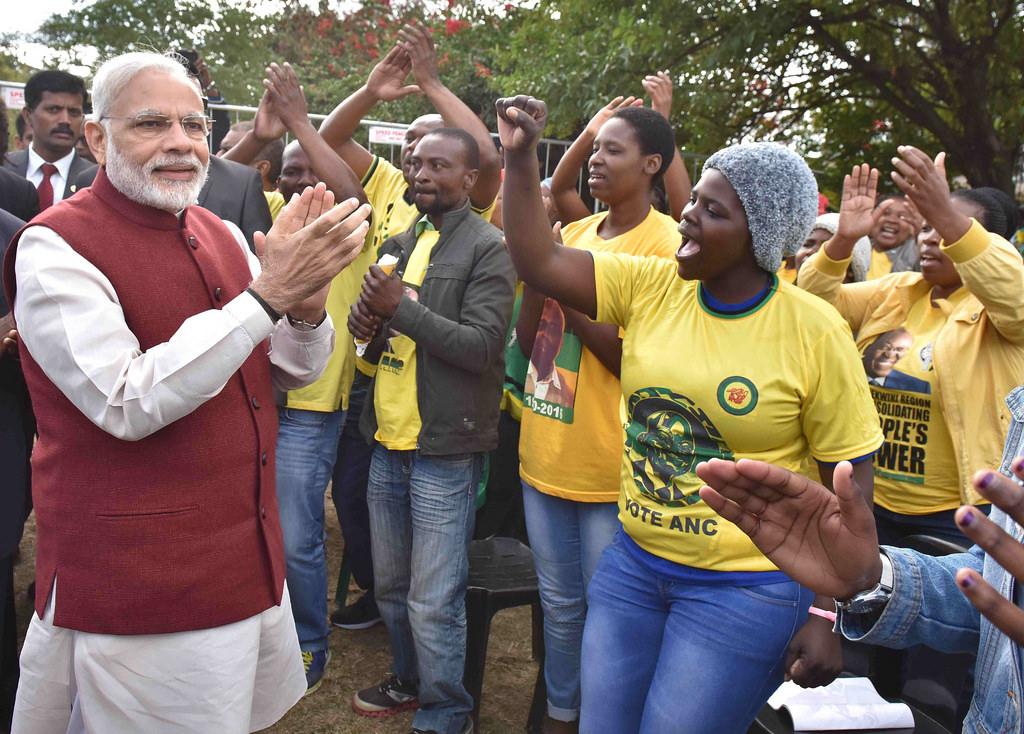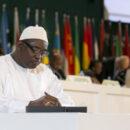Can India keep pace with China in Africa?

If it weren’t for China, Africa’s largest trading partner would be India. But how different is its mode of engagement?

Prime Minister Narendra Modi of India on a visit to South Africa in 2016.
With China’s top-level Africa forum set to begin in Beijing on 3-4 September, many outsiders not invited to the party will be watching closely. Among them will be China’s populous neighbour, and sometimes rival, India.
India has its own Africa summit, a triennial event, coming soon. And, like China, its trade with African has grown in leaps and bounds over the last decade. All too often, however, New Delhi’s attention on Africa has tended to fade after official visits.
This time it should stay tuned. Africa can no longer be viewed as intermittent and peripheral interest. Instead, the continent should be seen as part and parcel of New Delhi’s challenge of regaining lost geostrategic ground from Beijing’s expansionist endeavours. China’s Belt and Road Initiative along with its growing military activities across the Indian Ocean are already serving to redefine India’s own relationship with Africa.
India has long-standing political ties with the continent. It has a deeply integrated diaspora there. Its founding fathers supported African countries as they broke the bonds of colonialism and apartheid. Many African countries joined forces with India against hegemonic powers during the Cold War under the non-aligned movement.
But today, it is largely commerce that is driving India’s ties with Africa. In 2002-03, two-way trade was a paltry $6.5 billion. By 2012-13, it had risen to over $70 billion as India’s domestic economy continued its 50-year run of accelerated growth.
The increase has been so rapid that if China were not present, India would be Africa’s largest trading partner. At $63 billion in 2017-18, its trade with Africa easily surpassed that with the US and European partners. But China is in Africa, and in a big way. Chinese trade with Africa’s 54 countries stood at $172 billion in 2017, nearly three times India’s.
India in Africa
Facing down this lop-sidedness, Indian leaders argue that their country’s engagement is different from China’s. They claim that India’s is driven by the private sector in comparison to China’s state heavy approach. The reality, however, is that India employs many of the same methods – resulting in similar impacts – as China.
Mahatma Gandhi once envisioned that “the commerce between India and Africa will be of ideas and services, not of manufactured goods against raw materials after the fashion of western exploiters”. But today, India’s trade with Africa follows familiar trends.
Owing to its rapidly growing energy needs, oil is India’s biggest import from Africa, mostly from Nigeria. Along with gold and diamonds imports, which largely originate from South Africa, natural resources comprise the majority of India’s Africa trade. Adding insult to injury, some of India’s main exports to the continent are diesel and fuel produced from African crude oil but refined in Mangalore and elsewhere.
India’s broader economic relations with Africa are less impressive than many of its leaders care to admit. India’s investment in Africa amounted to only $14 billion by 2016, ranking between Singapore and Switzerland, and well behind its top investors of the US, UK, France, and China. As Malancha Chakrabarty at the Observer Research Foundation has pointed out, investment levels to Africa are often misstated as over $47 billion has round-tripped through the tax haven of Mauritius since 2008.
India’s loans to Africa, which received a $10 billion boost from Prime Minister Modi at the 2015 India Africa Summit Forum, are similarly modest in context. From 2000 to 2016, China provided $124 billion in loans. And like China, India also places stringent economic conditions on its African partners to contract mainly Indian companies and supplies for projects covered by Indian finance.
China’s deepening military engagement in Africa also gives it a footprint much deeper than India’s. Beijing opened its first military base overseas last year in Djibouti at the western end of what India regards as China’s “string of pearls”, a strategic containment policy that also includes Sri Lanka, the Maldives and other countries in India’s neighbourhood that have a growing economic dependency on China.
Countering China
What can India do in Africa to balance China’s expanding geopolitical presence in the Indian Ocean?
Beating China at its own game seems neither achievable for India nor advisable. But New Delhi could reinvigorate the “Asia-Africa Growth Corridor”, an economic cooperation agreement between India and Japan. It could ensure there is genuine momentum and developmental spin-offs from the project rather than just token awards for Indian and Japanese corporations.
India could also lead by example politically. As China promotes its model of state-led capitalism and authoritarianism, and as American democracy break downs, India can – in the words of African Development Bank President Akinwumi Adesina – be “a developing beacon for the rest of the world”. Many African countries resemble India’s multi-ethnic democracy, including the rights and poverty challenges it faces, more so than China’s political authoritarianism.
Finally, from Sudan to South Africa, India can redouble its security agenda along Africa’s eastern coast and settle its qualms with the Quad (an evolving security alliance with the US, Japan, and Australia) to deter Chinese navy dominance in the Indian Ocean. While Prime Minister Modi may hope that China and India can work together to build a better future in Asia, hedging against more tumultuous outcomes may be wise.
India is often seen as a footnote in China’s Africa engagement. It is one of many emerging economies, from Turkey to Brazil, engaging the continent in new economic and political activities. Together these interactions have relegated the West to a spectator position. But until India improves its attention span to changes in Africa, it will increasingly be China that dictates the geopolitical future across the Indian Ocean.
A version of this article originally appeared in The Wire.






The article is worthless the moment it starts to compare India with China. China is an Authoritarian regime that started early and developed themselves with the west basing the mass manufacturing in China. Whereas India grew with the strength of their human resource. India and Africa do have cultural similarities when it comes the way the society is run. Our ideologies is not based on theories of some person like Marx etc but on the wisdom and experience of generations of our forefathers. So the way our societies work is much more in common than the Western Capitalist ways or the Chinese Communist ways. Our strength are the people and the people are the ones guiding the growth in various areas rather than a bunch of people as in China. These collective effort of the community to build a nation based on consensus and wisdom will last longer and will be worth the time lag in starting it up. India and Africa will work closely in areas of Human resources and human development. India’s growth is not so far behind of China. Its a gap of 10 years and that gap will start to close from this year onward when India overtook China to become the fastest growing economy in the world. Both India and China are giants. Two giants who were the largest economies before the colonialists came and destroyed everything. So both these countries will play and important role not just China. The Wire is an article that is pro colonial rabid Anti-India and writes for their masters the colonialists. So i would suggest my African brothers and Sisters to avoid such channels that hate the natives. Thank you.